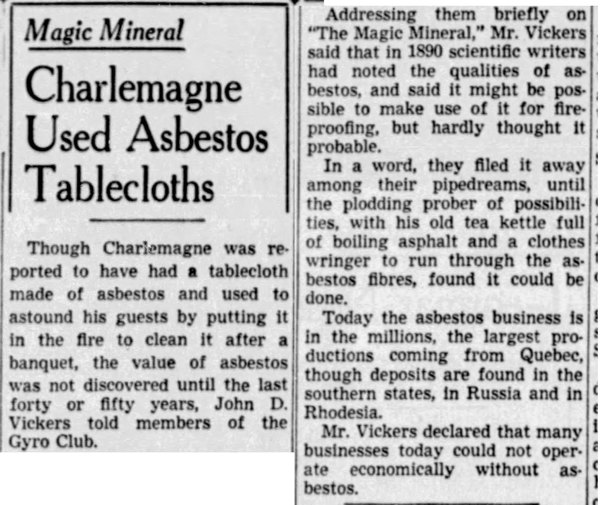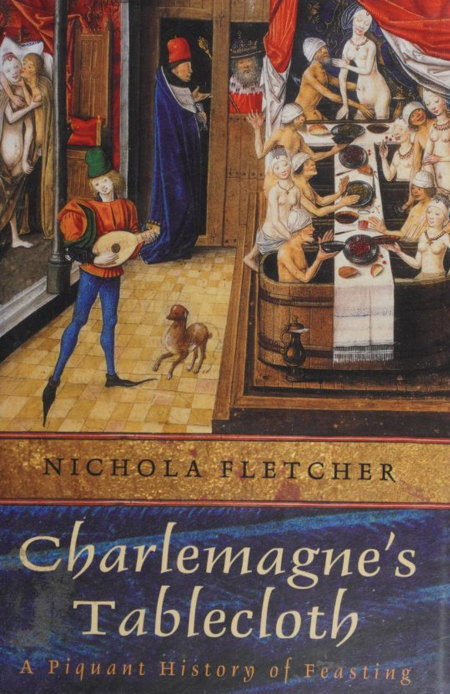Charlemagne’s asbestos tablecloth
Legend has it that Charlemagne owned an asbestos tablecloth. This allowed him to perform an unusual party trick. After hosting a feast, he would entertain his guests by throwing the tablecloth in the fire. All the food and stains would burn off, but the cloth itself didn't burn. When removed the fire it was not only undamaged but also sparkling clean.
The story can be found in a lot of sources, such as in the eleventh edition of the Encyclopedia Britannica (1911), in the article about asbestos. Or in the newspaper article below.

But is there any truth to the legend? The best answer to this question I could find is in the book Charlemagne's Tablecloth (2004) by Nichola Fletcher. Most of the book isn't actually about Charlemagne (it's about the history of feasting), but in the afterword she looks specifically at the legend.
She notes that the ancient Greeks and Romans had created cloth out of asbestos. Pliny the Elder wrote about the existence of asbestos napkins. So it's possible that Charlemagne had an entire tablecloth made from the material. However, she was unable to find any reference to the story in medieval sources about Charlemagne. Frustrated, she eventually requested help from Donald Bullough, an expert on Charlemagne who taught at St. Andrews University. This was Bullough's reply:

The story can be found in a lot of sources, such as in the eleventh edition of the Encyclopedia Britannica (1911), in the article about asbestos. Or in the newspaper article below.

Vancouver Daily Province - Mar 27, 1940
But is there any truth to the legend? The best answer to this question I could find is in the book Charlemagne's Tablecloth (2004) by Nichola Fletcher. Most of the book isn't actually about Charlemagne (it's about the history of feasting), but in the afterword she looks specifically at the legend.
She notes that the ancient Greeks and Romans had created cloth out of asbestos. Pliny the Elder wrote about the existence of asbestos napkins. So it's possible that Charlemagne had an entire tablecloth made from the material. However, she was unable to find any reference to the story in medieval sources about Charlemagne. Frustrated, she eventually requested help from Donald Bullough, an expert on Charlemagne who taught at St. Andrews University. This was Bullough's reply:
Alas! Charlemagne's "asbestos tablecloth" is the purest of pure myths, one of the many that were added to the ones inherited from the Middle Ages in the late eighteenth century and early nineteenth centuries, particularly in France — by-products of the Enlightenment and its Napoleonic reflections, as the "scientific" element in this one suggests.

Comments
The amount of damage that the Endarkenment and the Victorian era did to the public knowledge of history is incalculable. To this day, people a. believe that the dumb Christian Middle-Agers believed the world was flat (quid non), and yet b. themselves believe the world is flat (quid quoque non).
Posted by Richard Bos on 08/19/23 at 05:28 AM
Commenting is not available in this channel entry.



Category: Medieval Era | Fables, Myths, Urban Legends, Rumors, Water-Cooler Lore